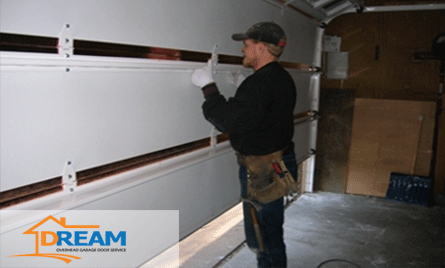Stop Those Garage Door Squeaks!
Noisy garages can be caused by loose hardware, worn-out rollers, dry parts, or a garage door simply having a lack of anti-vibration pads, but luckily it usually takes less than an hour to fix it.When inspecting a garage door, here are some tips that may help stop those squeaks:
Get Your Ratchet Out and Start Tightening Things Up
The best place to begin is by tightening up all of the bolts on the garage door.While doing that, check and replace any parts that look worn. All of the moving components on the garage door should be well-oiled with a garage door-specific non-silicone based product.
Make sure that the door and track nuts are tautened by using a ratchet and deep socket for getting additional torque. But be careful not to tighten them too much as that can strip the holes that the screws go in, making it much more difficult to fix. Overtightening can also cause the flat or oval carriage bolts to go right through a thin garage door.

Check for Worn-Out Parts
Common parts that wear out on a garage door are rollers and hinges. A lot of track rollers have bearings that are not sealed, which causes them to naturally deteriorate after years of use in an unclean atmosphere. The bearings can get so bad that the rollers tremble and shake the door as it operates. If your garage door has a crazy, scary shake, try replacing the rollers with nylon ones that have sealed bearings.
Any business that carries garage doors should have sealed nylon rollers in stock and they are easy to find online. Sealed nylon rollers are quieter and require less maintenance, but they tend to be more expensive than steel.
How to Change Out Rollers
Always swap out track rollers one at a time. If you notice torsion springs above the garage door, don’t even try to repair the bottom bracket ones yourself. The rollers in the bottom brackets are under constant tension and can snap back if you try to unbolt them. To prevent a potentially harmful accident, just call a professional repairman.
Dilapidated hinges are less common than bad rollers, but can be a reason for garage door noises as well. Bad hinges not only make the garage door loud, they can cause its seams to wear out. A little bit of give is normal, but if you see an unnatural size hole where the hinge pin meets the bracket, it is time to replace the hinge. Metal filings around the hinge pins is an early sign of the joints starting to give.
Don’t Forget to Check the Garage Door Opener Chain
As you are checking the door components, take a look at the opener chain on the garage door. A loose chain makes loud and annoying whacking sounds that can also cause the door to make erratic movements, in turn making rollers hit against its track. Garage doors usually come with track drive or screw drive openers which should be lubricated as well. If in doubt, refer to the owner’s manual which should provide a process for repairing the chain.
Continue to Lubricate
Lubricating all moving parts is the key to getting the garage door opening and closing quietly. Use a special door lube like the Prime Flo Garage Door Lubrication Kit, sold on Amazon or at most home improvement centers.
By spraying the springs, hinges and unsealed-style roller bearings with a special garage door lubricant ensures that that the dry film doesn’t attract dirt. For extra measure, hit any swivels or rotation bearings to shake loose anything that could be gummed up.
All moving garage door parts should be re-sprayed every six months to keep the garage door running smoothly. Keep in mind that although other oil or spray lithium greases may be less expensive, they tend to pick up the dust and dirt that you don’t want on your garage door’s moving parts.
How Anti-Vibration Pads Help With the Noise
The erratic shaking of the garage door causes the noise, so something that can alleviate this shaking can be installing anti-vibration pads over and under the garage door bracket. To do this, use a socket wrench to fasten a fender washer/lag screw and the pads to the ceiling.
One more thing…if you have problems with noise inside your house because of an attached garage, try this solution: Separate the opener from the garage trusses with rubber pads. Buy special rubber or cork anti-vibration pads or make rubber pads yourself out of old tires. Four 5.5” x 5.5” x 0.375” pads are $14 through Amazon, but since you are adding more thickness, remember to also get four fender washers and longer lag screws.


Boy I Would love this Garage Door Company and Articles!